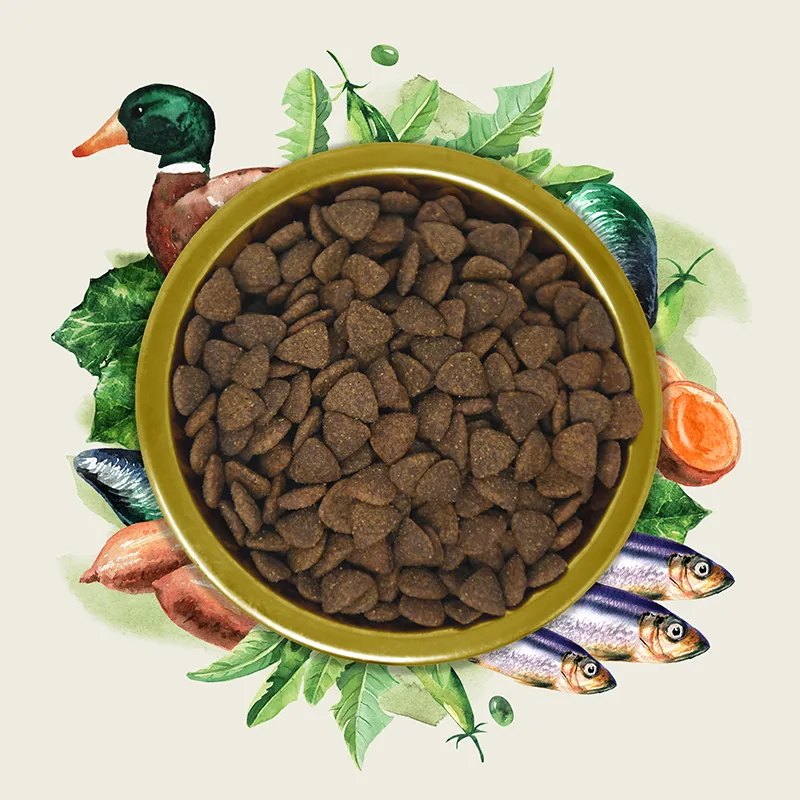So it’s national dog biscuit day, or International dog biscuit appreciation day as it is known around the world, and we’re here to talk about all things dog biscuits, from where it all started, to how Eden is leading the way with pioneering new complete dog biscuit recipes. Whether it’s a shop purchased dog biscuit, or a batch of homemade dog biccies you’ve whipped up to celebrate, your pooch is certainly going to be loving this commemorative day.
Believe it or not, the humble dog biscuit actually dates back to 1860 when an electrician called James Spratt introduced the very first commercially-prepared dog biscuit. An idea born from observing dogs being fed leftover biscuits from a ship, he developed a mix of wheat meal, vegetables, beetroot and beef blood which became the first commercially fortified dog biscuit in Great Britain. Prior to this, it’s believed that dogs were mostly fed on table scraps, with their main source of protein coming from horse meat. However, the use of horse meat in pet food was outlawed in the 1970s.
Fast forward to the present day and it's astonishing to see how times have changed when it comes to feeding our canine companions. As mentioned, Eden are leaders in quality dog food, where modern research meets advanced knowledge of the ancestral diet to create a very special biscuit which has highly digestible proteins, unlike most products available in the current market.
Although a lot has changed since feeding dogs scraps from the table, it’s actually only in recent years that humans have begun to really understand the nutritional requirements of dogs, and with that have started to formulate meals and biscuits that are not only high quality but are species appropriate. Previously, dog food companies have formulated their dog biscuits using wheat, grain, rice and white potato, all ingredients which are cheap to acquire and are used as ‘fillers’. And while some companies do still choose to use these ingredients, it is important to understand that they aren’t the optimal choice for our four legged friends.
This is where education and research into dog biscuit ingredients and the benefits (or lack of them) has really taken off. Only in the past 15 years or so have grain-free foods gained traction in the market with the knowledge that grains aren’t necessarily harmful to dogs, more that they do not provide adequate nutrition for optimal health and can, in some cases, cause stomach and digestive issues. Diving deeper into exactly what a dog needs nutritionally, and how their digestive system is unique and widely different from our own, we’ve found that it’s not only important what we put into their food but how their digestive system absorbs these nutrients. Dogs' gastrointestinal tracts (the tract or passageway of the digestive system that leads from the mouth to the anus) are significantly shorter than humans’, being on average 6 feet in dogs compared to 26 feet in humans. The shorter tract means food isn’t inside the body for long and therefore doesn’t have as much time to absorb all the vital nutrients. This fact alone is enough to make you stop and think about what you feed your dogs and most importantly what they’re getting out of it.

There’s more to feeding than the high quality ingredients though; there’s a science behind the preparation of the proteins that really matters if you’re after the most nutritional benefit from your pooch’s dinner. You can put excellent ingredients into the food but if the dog’s digestive tract is unable to make the most out of those nutrients passing through, then they’re going to do just that: pass through with no real effect or nutritional benefit. Eden has worked extremely hard to produce a dog food that has been specially formulated for dogs’ digestive systems. Using cutting edge techniques, the proteins in the dog food undergo a proteolysis (or hydrolysis) process prior to consumption. After dogs eat food containing protein, the process of proteolysis begins, as enzymes released in different parts of the gastrointestinal tract break proteins down into amino acids and small peptides. The process of breaking down these proteins means the body is able to absorb nutrients and use them around the body for muscle, skin and hair.
Using naturally occurring enzymes during the manufacturing process, the protein source in the food is broken down into the tiniest possible particles prior to consumption. This means the body has quicker access to these nutrients and doesn’t exert energy breaking the proteins down first before making use of them. The result is a food that is highly digestible and far easier on dogs with allergies and/or sensitive tummies specifically, but will benefit all dogs at all life stages.
With all of this in mind, if you’ve decided to make some homemade biscuits to treat your pooch instead, be mindful of any recipes that use flour. Obviously, this is a grain and can pose digestive problems to some dogs. If you’re looking for recipes for homemade treats, look out for hypoallergenic ones that don’t include grains of any sort. Plenty use peanut butter, which can be a great source of vitamin E, just ensure it doesn’t contain any added sugars, preservatives or palm oil. A great replacement for general purpose flour is to use coconut flour and coconut oil, which are both a grain and gluten-free source of high quality protein that can provide essential nutrients and fatty acids to support the physical health of your pooch.
Lastly, you can’t enjoy a biscuit without a cup of tea (for you obviously, not your dog). Celebrate this great day with them and grab a biscuit for yourself too while you’re at it, although we’d suggest a custard cream.

